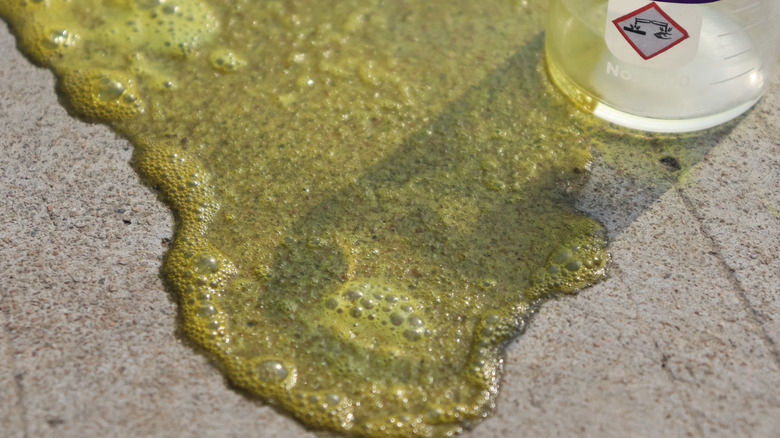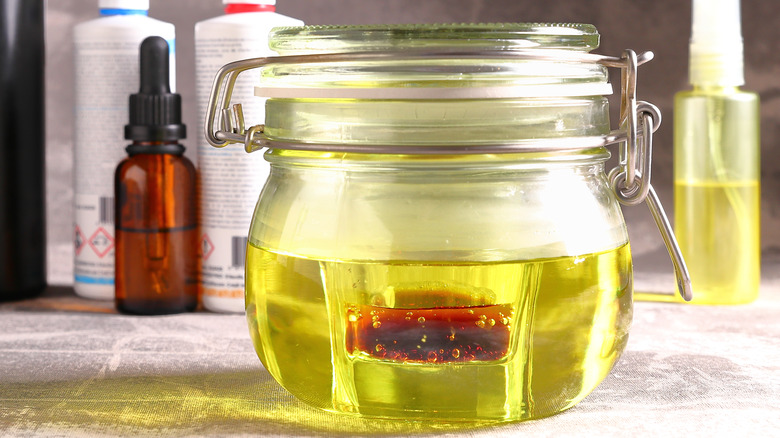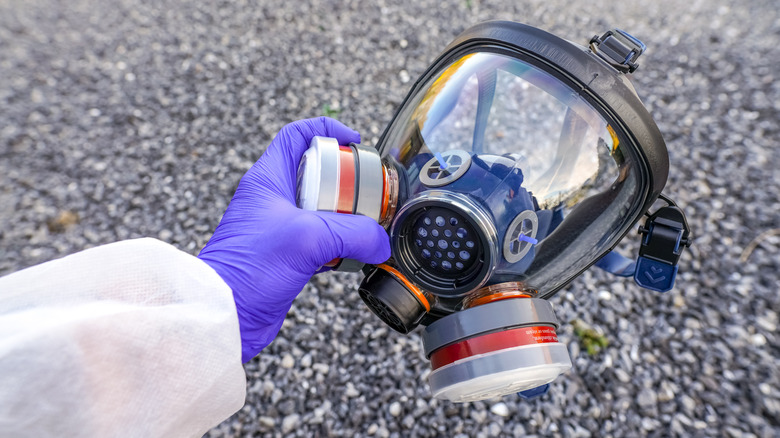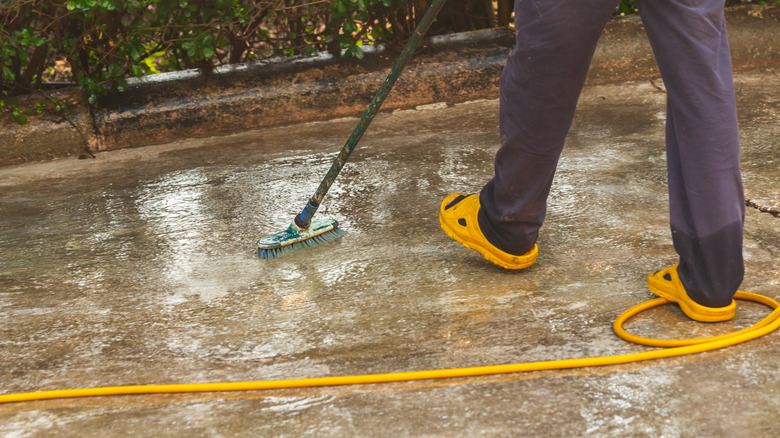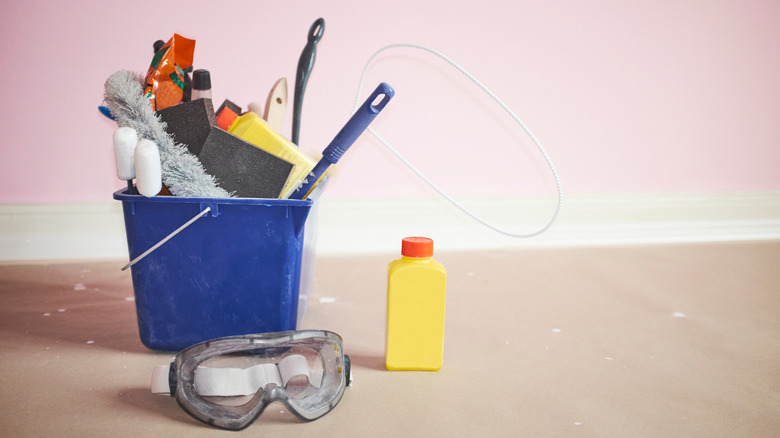What Is Muriatic Acid And How Can It Be Used To Clean Your Home?
Any seasoned homeowner knows that there's plenty of different ways to get your space as fresh and sparkling as possible — there's the whole dryer sheets on your baseboards trick, the baking soda on your burnt pots and pans idea straight from TikTok, and this vodka hack that lifts any stain out of your carpet. That's not to mention some of the best natural cleaners, either, like lemon juice and distilled vinegar — most of the time, you can get any job done around the house with safe solutions that you may already have lying around.
And yet, some messes are just too big to be tackled with these everyday cleaners, which is where the serious ones come in. Muriatic acid, for example, is a store-bought cleaner that many recommend for the toughest of jobs. But before you go dumping this chemical left and right on any old spill or buildup, keep in mind that it's just that: a chemical, and should be treated as such. Read on to be sure it's the right cleaning job to break out the muriatic acid for — and if it is, take note of our tips to stay safe while tidying up.
What is muriatic acid?
With an intimidating name like muriatic acid, it's expected that you'd give any cleaning job a second thought. Fortunately, its properties are pretty straightforward! Muriatic acid is a form of hydrochloric acid with impurities, such as iron, that give it a yellow tinge, per PrepScholar. Despite being considered extremely corrosive, it's actually milder than pure hydrochloric acid. That's what makes it fair game for some more severe home cleaning jobs, but you shouldn't use it without a complete understanding of how to handle it safely.
Muriatic acid has a pH of 1 to 2, which puts it into the same category as lemon juice — another common household cleaner — but it's still significantly more caustic, according to the outlet. That's because it can be upwards of 31% acid, making it nearly six times more concentrated (and that much more harmful if used incorrectly), the site explains. Although you can snag a bottle of muriatic acid in any hardware or home improvement store, it's certainly not the same as picking up some Lysol.
It's also not suitable for any old day of spring cleaning, either — because of its corrosiveness, muriatic acid is only recommended for a small handful of specific home projects.
How to use muriatic acid
The number one rule for using muriatic acid is that safety precautions cannot be ignored. Muriatic acid can burn skin and eat through metal and plastics, so it shouldn't be taken lightly. Popular Mechanics notes that first, be sure that the space you're working in is completely ventilated — don't use it in a closed off space like a bathroom, unless you open a window.
In addition to preparing your space, be sure to prepare yourself, too. Get in full gear before handling any muriatic acid — you'll want to put on safety goggles to protect your eyes from splashback, as the acid can cause blindness, the site notes. Put on a respirator to help with ventilation, and wear gloves and full-coverage clothing, since any exposed skin is susceptible to burns.
When it comes time to use the acid, you should always dilute it in water according to the instructions on the cleaner you purchased. Always pour the water first, and add acid as needed (typically in a 1:10 ratio) to prevent any splashing. If you do spill some muriatic acid, you can neutralize it with baking soda or plain water — always keep both easily accessible when handling the chemical to stay as prepared as possible.
Once you're done with the cleaning job, you'll have to dispose of the acid according to your local authorities' regulations. Be sure to do the proper research beforehand, as pouring it outside or down a drain can be extremely dangerous, per Popular Mechanics.
When to use muriatic acid to clean
So when can you use muriatic acid, you might be wondering? The top uses for cleaning your home with muriatic acid are fighting off basement mold, squashing stubborn rust (only on stainless steel), and cleaning up masonry projects, like preparing stone or brick for more work, says Bob Vila. If you're working in your basement, ventilate the area since it's enclosed, wear a respirator, and dilute the acid in a 1:9 mixture with plain water. Apply the solution to any mold on hard surfaces like concrete or grout and clean it thoroughly with water, then leave the area for a few hours — it should be safe and mold-free afterward!
The same applies for masonry projects — you can apply a 1:10 solution of the acid and water to remove efflorescence from brick then scrub it off, which will allow you to apply a new sealant and prevent the crystalline coating from reforming. This will also reduce any discoloration on brick, stone, or concrete, since it will neutralize the alkalinity that causes the inevitable wear and tear on masonry surfaces.
Another great cleaning use for muriatic acid is pool maintenance since it performs so well on hard surfaces. You can use a diluted mixture to remove pool stains and clean filter cartridges and tile grout from buildup, and reduce the pH of your pool water if needed (via SwimmingPool.com).
Is muriatic acid safe?
Muriatic acid isn't necessarily unsafe — after all, it's sold in stores — but if it's not handled properly, it can have harmful consequences. Without the proper safety precautions, you can seriously injure yourself, warns Natural Handyman. Some risks include burning of the skin or eyes, as well as an overwhelming chemical order that can affect your breathing when not ventilated. That's only to mention the effects on yourself — it can also damage any material surface it touches, like metals or plastics, so it's not safe to use across the board.
Natural Handyman reiterates that while muriatic acid has its benefits, you should always reach for it last for home cleaning projects. Exhaust all other cleaning options first, and seek out alternatives — and we're not just talking about vinegar! Try out less harsh acids and chemicals, like phosphoric acid, which is about as effective without all of the added risks. Another option to swap muriatic acid for is TSP, or trisodium phosphate, which is another serious chemical cleaner for some grittier masonry projects.
If you do need to resort to muriatic acid to clean your house, always follow the instructions on the bottle and do your research to prepare for the task. When done right, muriatic acid can be an incredibly useful cleaner to help spruce up your home amid renovations, tidy up your pool, or tackle mold once and for all.
